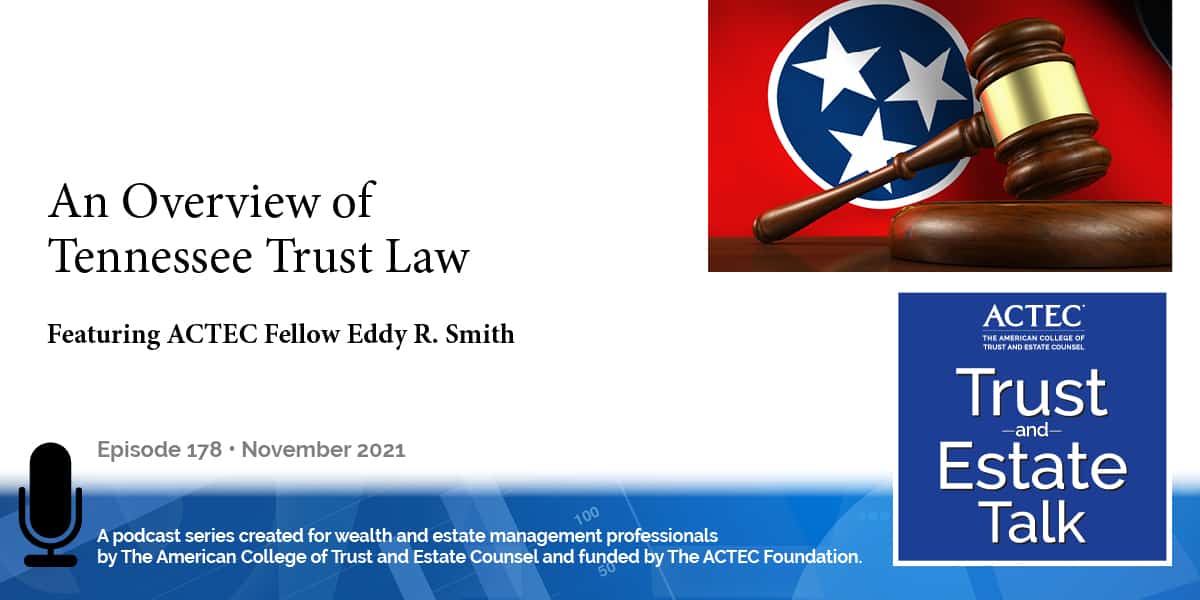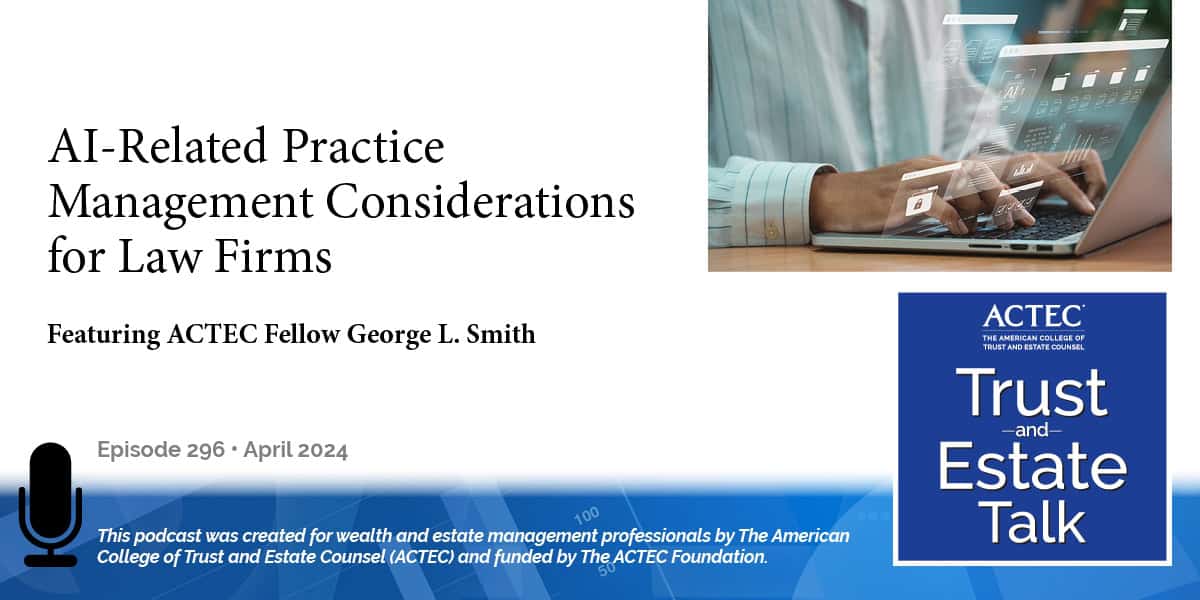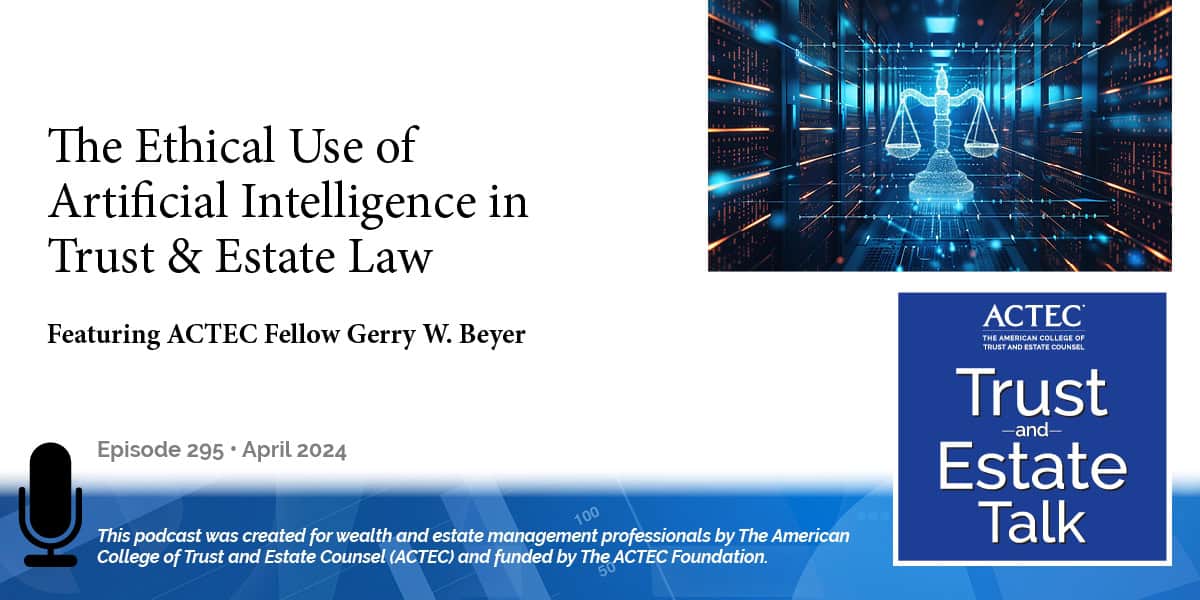An Overview of Tennessee Trust Law

An overview of Tennessee trust law, that’s the subject of today’s ACTEC Trust and Estate Talk.
Transcript/Show Notes
This is Travis Hayes, ACTEC Fellow from Naples, Florida. Tennessee has aggressively modified its’ trust statutes over the last 20 years in an effort to be recognized as a top US trust jurisdiction. Today, you’ll be hearing from ACTEC Fellow Eddy Smith from Knoxville, Tennessee, who will review several features of Tennessee trust law as part of evaluating Tennessee as a trust jurisdiction. Welcome, Eddy.
Thank you, Travis. I appreciate it. As Travis said, there have been a lot of changes in Tennessee trust law over the past 20 years, and they coalesce to create a lot of incentive for Tennesseans and those around the country to consider Tennessee trusts. Primarily, the far-reaching changes make it difficult for beneficiary’s creditors, including ex-spouses, to reach trust interests. Among the features available to all trusts, if a trust has a spendthrift provision, then no creditor or assignee of a beneficiary may force a distribution, even if the beneficiary has the right to enforce a mandatory distribution.
Similarly, regardless of whether a trust contains a spendthrift provision, if an interest is a discretionary interest, then no creditor may force or reach a distribution, or require a fiduciary to exercise discretion to distribute. The statute says the discretionary interest is, quote, “neither a property interest, nor enforceable right. It is a mere expectancy.” Tennessee’s made its modification of irrevocable trust procedures pretty flexible.
Irrevocable, Special Purpose and Special Quality Trusts
If the trustee and all qualified beneficiaries agree to modify an otherwise irrevocable trust, so long as the settlor does not object or after the settlor’s death, if the trustees and qualified beneficiaries agree the modification does not violate a material purpose of the trust, then the change can be made.
We have several types of special purpose trusts and special quality trusts. We have elective community property trusts, as you might know, that for married couples who live in separate property states, then at the first death, we often only get a half a step up in income tax basis. But in a community property state, then at the first death, both spouses interests in community property receive a basis adjustment. Tennesseans, or those creating trusts in Tennessee, can achieve the same potential benefits by transferring assets to a Tennessee community property trust.
We have a sort of simplified version of a creditor protection trust, where a married couple can transfer tenancy by the entirety property into the trust and maintain that tenancy the by the entirety protection. As you might know, tenancy by the entirety ownership allows protection from creditor of one spouse while both spouses are living, while Tennessee MAP trusts, Marital Asset Protection trust, goes one step further.
MAP, DAPT and TIST Trusts
They not only protect assets from the creditors of one spouse while both are living, but after one spouse dies, and so long as the survivor remains a beneficiary of the trust and does not have a non-fiduciary power to appoint to self, then that surviving spouse’s creditors cannot get to trust assets. Many states now allow individuals to create self-settled domestic asset protection trusts, or DAPT’s for short.
They purport to offer the same creditor protection available in offshore jurisdictions, but at a reduced cost and hassle. Tennessee joined the DAPT states in 2007 with the creation of Tennessee Investment Services Trusts, or TISTs. A TIST requires at least one Tennessee trustee who is not the settlor and who materially participates in the administration of the trust. There were several statutory changes in 2021, and one is to shorten the period under which a creditor has to go after assets in one of these trusts.
If the creditor was a creditor at the time of the transfer to the trust, then they have the longer of 18 months after the transfer to the trust, or six months after they discover – should discover – the transfer. If the creditor became a creditor after the transfer to the trust, then they just have the straight 18 months. A creditor cannot bring a successful claim, with respect to property transfer to a TIST, unless she can prove by clear and convincing evidence that the settlor transferred the property to the TIST with actual intent to defraud that specific creditor. An incredibly high standard that’s going to be very difficult for creditors to meet.
Protection and Provision Changes in 2021
There were several other changes in 2021, also with the express purpose and goal of making Tennessee a desirable trust jurisdiction. We have a new statute that provides an opportunity to register a trust in the state of Tennessee as a mechanism to claim Tennessee jurisdiction and disclaim other states’ jurisdiction.
We have a statute that eliminates any concern about a reciprocal trust agreement by a creditor that if two spouses create trusts for each other, we ignore the fact that one spouse created a trust when evaluating the protection offered by the other trust. We have a statutory provision which says the decedent’s creditors cannot reach a trust property that was subject to the decedents general power of appointment, unless the decedent actually exercised the power of appointment, and exercised the power to the decedent or the decedent’s estate. So, existence of the power of appointment is not enough.
We added a provision for trustees of silent trusts, trust that limits or forbids the trustee from reporting to the beneficiaries. That created a statute of limitations problem if the trustee didn’t have anybody to account to, now that the trustee of those trusts can account to a representative of the beneficiary or to the settlor, a trust protector, or a trust advisor, and start the statute of limitations. Tennessee reworked its decanting statute, making it clearer that a decanting cannot add beneficiaries, but it can limit or eliminate a beneficiary’s income interest in many cases, and can also accelerate the beneficial interest of a future beneficiary after the settlor’s death.
And there are several other features of Tennessee trust law that make it an attractive jurisdiction to consider for trusts. A 360-year perpetuities period, explicitly allowing special purpose entities as trust protectors. Several years ago, Tennessee repealed its state inheritance tax, and as of January 1st of this year, repealed its state income tax.
Making Use of Tennessee Trusts
So, how do you – Tennesseans and those outside Tennessee – make use of these rules in creating trusts? Well, one way is that clients – will often have trusts when they wouldn’t have had trusts or extend trusts longer so a trust that might have ended for a young beneficiary may instead give the beneficiary the right to become sole trustee and continue. Several of the changes this year reversed the trend that had been true in prior years of increasing settlor control and making it harder for trustees and beneficiaries to modify trusts downstream.
So, clients and their drafting attorneys have to consider whether to push back on any of that. One way to push back is to add or beef up material purpose statements. Another is to override statutory provisions like decanting and modification and maybe even providing within the trust the trusts own decanting or modification procedures. In sum, Tennessee’s working hard to be a jurisdiction with modern and streamlined trust statutes, and those around the country should consider Tennessee when they’re looking for a trust jurisdiction.
Thank you, Eddy, for providing us with a summary of Tennessee trust law.
You may also be interested in:
This podcast was produced by The American College of Trust and Estate Counsel, ACTEC. Listeners, including professionals, should under no circumstances rely upon this information as a substitute for their own research or for obtaining specific legal or tax advice from their own counsel. The material in this podcast is for information purposes only and is not intended to and should not be treated as legal advice or tax advice. The views expressed are those of speakers as of the date noted and not necessarily those of ACTEC or any speaker’s employer or firm. The information, opinions, and recommendations presented in this Podcast are for general information only and any reliance on the information provided in this Podcast is done at your own risk. The entire contents and design of this Podcast, are the property of ACTEC, or used by ACTEC with permission, and are protected under U.S. and international copyright and trademark laws. Except as otherwise provided herein, users of this Podcast may save and use information contained in the Podcast only for personal or other non-commercial, educational purposes. No other use, including, without limitation, reproduction, retransmission or editing, of this Podcast may be made without the prior written permission of The American College of Trust and Estate Counsel.
If you have ideas for a future ACTEC Trust & Estate Talk topic, please contact us at ACTECpodcast@ACTEC.org.
© 2018 – 2024 The American College of Trust and Estate Counsel. All rights reserved.
Latest ACTEC Trust and Estate Talk Podcasts

AI-Related Practice Management Considerations for Law Firms
A discussion for law firms about how to incorporate AI in their practice management, including staff considerations, the “billable hour,” and more.

The Ethical Use of Artificial Intelligence in Trust & Estate Law
A law professor offers insights into the risks, rewards, duties and ethical considerations of lawyers using AI in their T&E practices.

What Is Artificial Intelligence and the Impact on T&E Law in 2024 and Beyond?
A primer on the types and uses of AI, then a deeper dive into the impact on trust and estate law from types to applications to ethical considerations.

